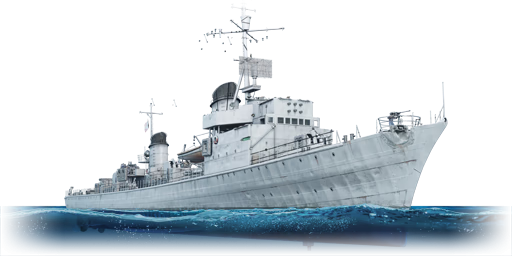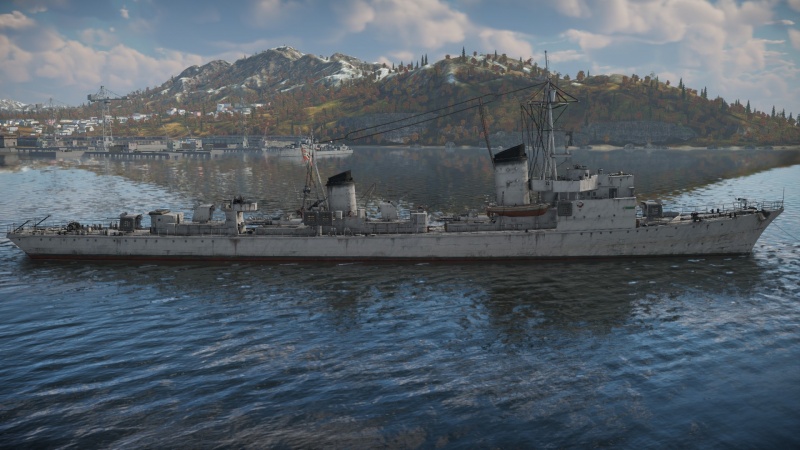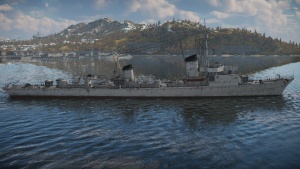T22
Contents
Description
The Type 1939-class, T22, 1944 is a rank I German destroyer with a battle rating of 3.7 (AB/RB/SB). It was introduced in Update 1.79 "Project X" as part of the fleet closed beta test. It is a big improvement from the first German destroyer (the Type 1924 Leopard) in every major way.
General info
Survivability and armour
Talk about the vehicle's armour. Note the most well-defended and most vulnerable zones, e.g. the ammo magazine. Evaluate the composition of components and assemblies responsible for movement and manoeuvrability. Evaluate the survivability of the primary and secondary armaments separately. Don't forget to mention the size of the crew, which plays an important role in fleet mechanics. Save tips on preserving survivability for the "Usage in battles" section. If necessary, use a graphical template to show the most well-protected or most vulnerable points in the armour.
Mobility
Write about the ship's mobility. Evaluate its power and manoeuvrability, rudder rerouting speed, stopping speed at full tilt, with its maximum forward and reverse speed.
Modifications and economy
Armament
Primary armament
The 10.5 cm cannons, while being smaller than the guns of its contemporaries, can still perform effectively with its lower reload speed. It offers a little more forgiveness to the player, while often offering less to the target. The damage dealt by the HE round with the base fuse, along with its reload, allows the player to whittle away at the target, and with a little aiming, can render the target completely defenceless.
Secondary armament
Some ships are fitted with weapons of various calibres. Secondary armaments are defined as weapons chosen with the control Select secondary weapon. Evaluate the secondary armaments and give advice on how to use them. Describe the ammunition available for the secondary armament. Provide recommendations on how to use them and which ammunition to choose. Remember that any anti-air armament, even heavy calibre weapons, belong in the next section. If there is no secondary armament, remove this section.
Anti-aircraft armament
An important part of the ship's armament responsible for air defence. Anti-aircraft armament is defined by the weapon chosen with the control Select anti-aircraft weapons. Talk about the ship's anti-air cannons and machine guns, the number of guns and their positions, their effective range, and about their overall effectiveness – including against surface targets. If there are no anti-aircraft armaments, remove this section.
Additional armament
Describe the available additional armaments of the ship: depth charges, mines, torpedoes. Talk about their positions, available ammunition and launch features such as dead zones of torpedoes. If there is no additional armament, remove this section.
Usage in battles
The Type 1939 has it's best usage on supporting allies and destroying light vessels or lightly armoured destroyers, it has good maneuverability so the best tactic is to dodge and attack in short bursts, in any case is a really capable destroyer with effective anti ship capabilities.
Pros and cons
The Type 1939 has some trouble with fighting ships from its br because of it's unnusual gun caliber, but it has some Pros and Cons in usage that can improve the gameplay as you can see below.
Pros:
- Great reload speed
- Doesn't catch on fire very easily
- Easy to aim for it's fast firing weapons
Cons:
- Insuficient crew, often being killed by crew knocked out
- Weak guns, you will have some trouble attacking destroyers of your br
- Your low in battle speed will make you an easy target to other destroyer and vessels with torpedoes
History
Referred as the workhorses of Kriegsmarine, the Type 1939 general purpose destroyers were created to escort blockade runners and battleships. They saw action in every major German operation, from Norway until the end of World War 2.
Media
See also
External links
| Germany destroyers | |
|---|---|
| Torpedo boats | |
| Type 1924 | Jaguar · Leopard · Luchs |
| Type 1939 | T22 · T31 |
| Destoyers | |
| Type 1934A | Z12 Erich Giese · Z15 Erich Steinbrinck |
| Type 1936 | Z20 Karl Galster · Z22 Anton Schmitt |
| Type 1936A | Z25 · Z32 |
| Type 1936B | Z43 |
| Type 1936C | Z46 · Z47 |






